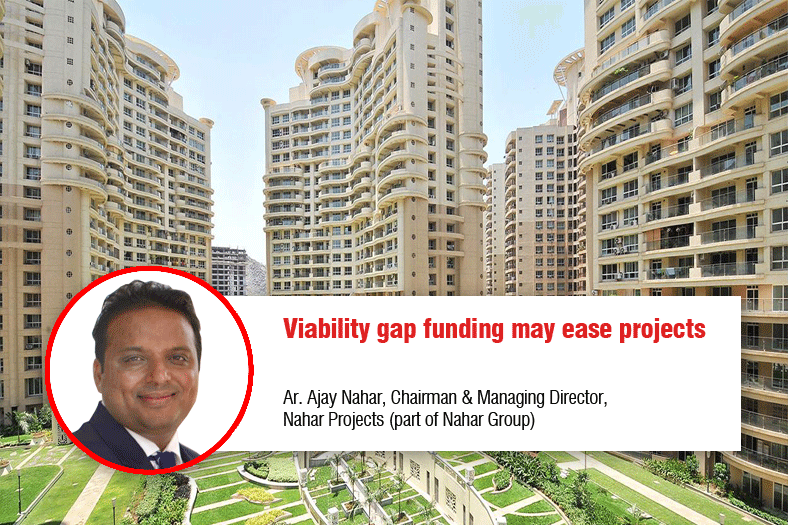Viability gap funding may ease projects

A lot of cities in India have fruitfully transformed into smart cities through the adoption of technology traversing areas such as transportation, energy, water management, healthcare amongst others. A smart city requires seamlessly interconnected systems that can be retrofitted over the existing infrastructure to build world-class smart cities in India. However, such systems need to offer real-time actionable data and analytics to its stakeholders, i.e., both the administrators and the citizens, in an integrated manner, says, Ar. Ajay Nahar, Chairman & Managing Director, Nahar Projects (part of Nahar Group).
What are the major challenges faced while developing smart cities?
Major challenge will be channelling finance to smart cities because the estimated per capita investment cost (PCIC) is Rs 43,386, as reported by the High Power Expert Committee (HPEC). The total estimate of investment in smart city totals up to Rs 7 lakh crore within a span of 20 years and an annual requirement of Rs 35,000 crore. Mobilising such huge finance is a challenge for any government that can look for public–private partnership (PPP) in order to gather funds via viability gap funding. Apart from this, quick approval takes a great deal of time for clearance from any government institution. The project is time bound and clearances and approvals must be granted with minimum time so that the project sticks to the schedule.
How are smart cities leveraging construction activities in Indian cities?
Developers are likely to get a huge window of opportunity to offer new projects in the upcoming smart cities, which boost the regional, social and economic infrastructure that will also create employment opportunities in the real-estate sector. The growth of a smart city project can give way to massive opportunity, particularly when we talk about demand for affordable homes. The smart city projects are increasingly allocating enough land and housing for low-income groups (LIGs), thus increasing the demand for realty in the country. Secondly, smart cities also offer an excellent investment options with a sustainable scope for price appreciation, especially for a long-term investment purview. Evolution of the smart cities will push the demand of office spaces as well as hotels, in addition to service apartments and shopping malls. The real-estate sector contributes about 6 per cent to India’s GDP.
How do you look at the technology, products and solutions available for building world-class smart cities in India?
Many cities in India have successfully transformed into smart cities through the adoption of technology traversing areas such as transportation, energy, water management, environment, governance, public safety, housing, education, healthcare amongst others. A smart city requires seamlessly interconnected systems that can be retrofitted over the existing infrastructure to build world-class smart cities in India. Such systems need to offer real-time actionable data and analytics to its stakeholders, i.e., both the administrators and the citizens, in an integrated manner.
What are the existing and emerging trends in designing smart cities?
Nahar Group has proved its proficiency in developing integrated townships, lifestyle residences and industrial and commercial space, Nahar’s Amrit Shakti is a flagship project of Nahar Group at Chandivali, Andheri East in Mumbai that boasts over 40 high-rise towers across 125 acres of lush green landscape, which is just a little over one third of its development. Some of the existing trends consider while designing smart cities which are as per people’s perspective like adequate water supply, assured electricity supply, sanitation, including solid waste management, efficient urban mobility and public transport, health and education. Some of the trends which are emerging, IT connectivity and digitalisation, good governance, especially e-Governance and citizen participation, technology such as phone and web application to keep citizen engagement with urban population.
Some of the emerging trends are IT connectivity and digitalisation, good governance especially e-governance and citizen participation.
Ar. Ajay Nahar, Chairman & Managing Director, Nahar Projects (part of Nahar Group)
7
Cookie Consent
We use cookies to personalize your experience. By continuing to visit this website you agree to our Terms & Conditions, Privacy Policy and Cookie Policy.






